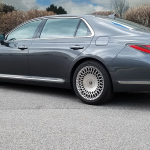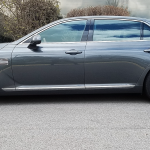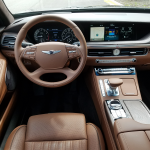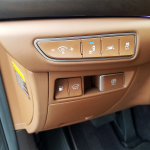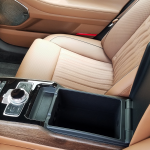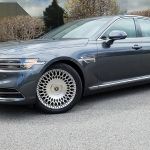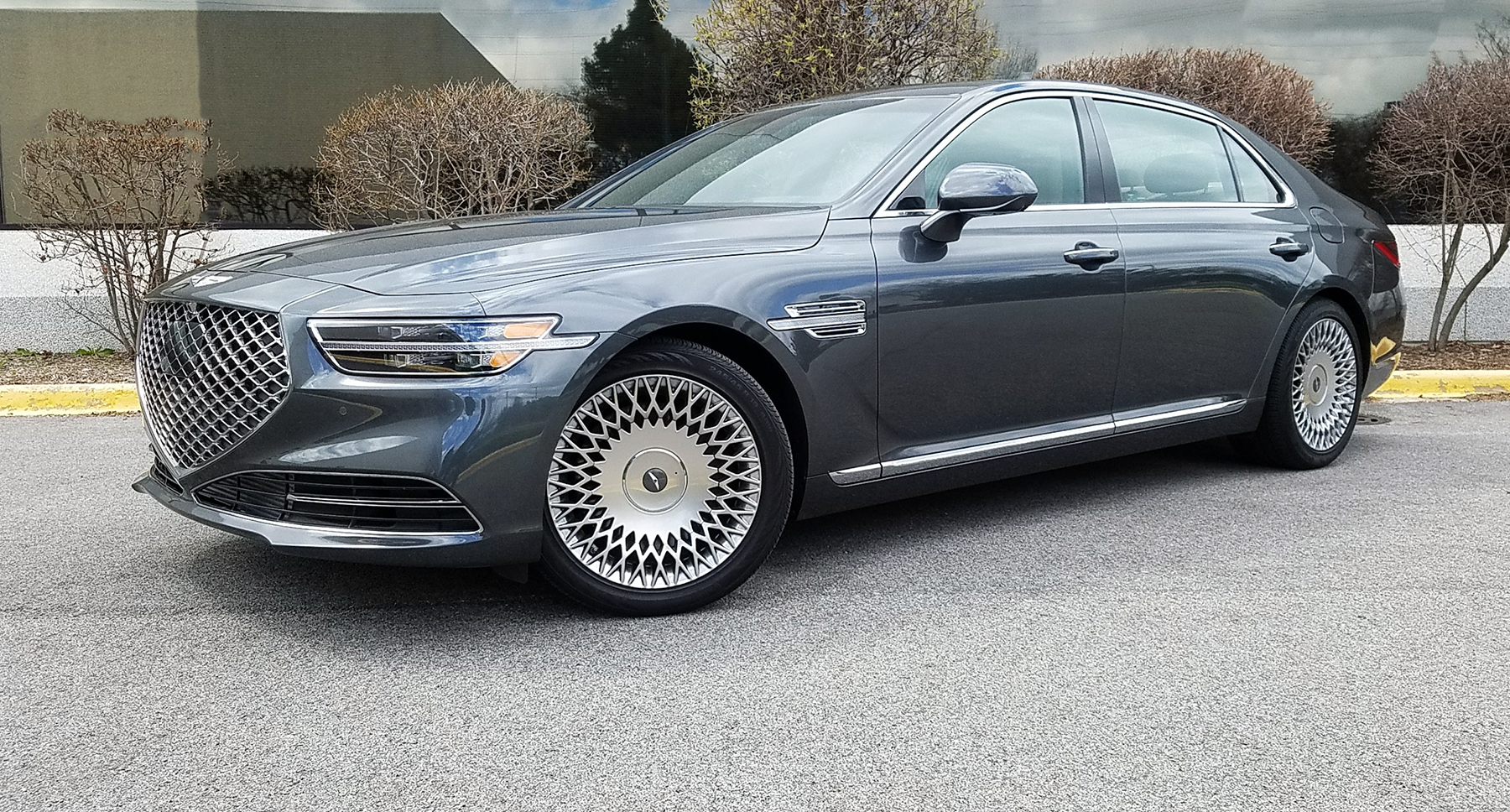
 2020 Genesis G90 3.3T Premium AWD
2020 Genesis G90 3.3T Premium AWD
Class: Premium Large Car
Miles driven: 410
Fuel used: 20.0 gallons
| CG Report Card | |
|---|---|
| Room and Comfort | A |
| Power and Performance | B |
| Fit and Finish | A- |
| Fuel Economy | B- |
| Value | A |
| Report-card grades are derived from a consensus of test-driver evaluations. All grades are versus other vehicles in the same class. Value grade is for specific trim level evaluated, and may not reflect Consumer Guide's impressions of the entire model lineup. | |
| Big & Tall Comfort | |
| Big Guy | A |
| Tall Guy | A |
| Big & Tall comfort ratings are for front seats only. "Big" rating based on male tester weighing approximately 350 pounds, "Tall" rating based on 6'6"-tall male tester. | |
| Drivetrain | |
| Engine Specs | 365-hp 3.3-liter |
| Engine Type | Turbo V6 |
| Transmission | 8-speed automatic |
| Drive Wheels | AWD |
Real-world fuel economy: 20.5 mpg
Driving mix: 50% city, 50% highway
EPA-estimated fuel economy: 17/25/20 (city, highway, combined)
Fuel type: Premium gas recommended
Base price: $74,700 (not including $995 destination charge)
Options on test vehicle: None
Price as tested: $75,695
Quick Hits
The great: Compelling dollar value; passenger room and comfort
The good: Quietness; ride quality; powertrain performance; new features for 2020
The not so good: So-so fuel economy; polarizing front-end styling
More G90 price and availability information
John Biel
Diamonds. They seem to be everywhere in the 2020 Genesis G90. You’ll find their shape in the grille, in the alloy wheels, and stitched into the seats.
Better yet, if you are shopping in the premium-large-car market, you might have some scratch left over for an actual diamond or two if you choose a G90. It’s priced lower than all the leading aspirational cars in the segment—by as much as $20,000 or so at the extreme.
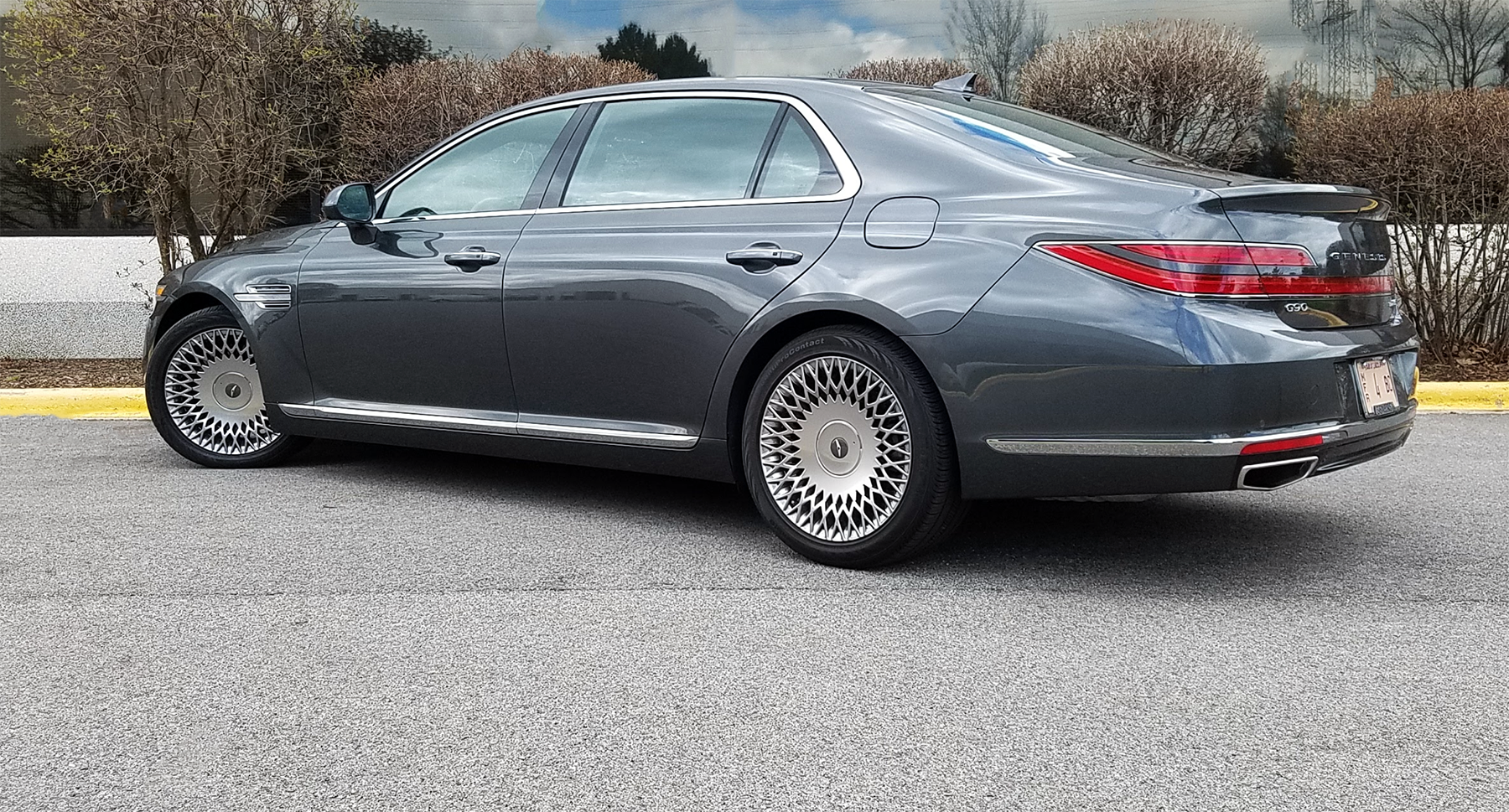
For 2020, the G90 has extensively revised styling. Genesis says that the doors and roof panel are the only exterior elements carried over from the previous car. Most striking is a wholly different grille. (The execution represents diamonds in the rough to critics who find the pentagonal opening garishly outsized.) Modest Aston Martin-like bright-metal vents dress up what had been plain front fenders. In back, new taillights stretch out like ribbons across the redone trunklid.
Quick Spin: 2019 Lexus LS 500 F Sport
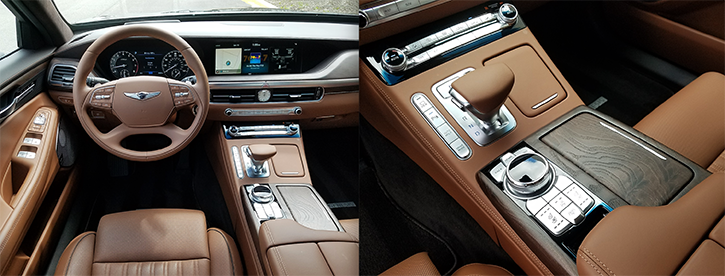
Also on hand are newly installed safety and technology features that bring the flagship Genesis—which was launched for 2017—up to current standards. They include “Highway Driving Assist” (it automatically adjusts cruising speed to match a vehicle ahead or changes to speed limits), lane-following assist, “Safe Exit Assist” (to keep passengers from exiting into traffic), rear cross-traffic collision avoidance, and forward-collision avoidance that can now detect bicycles. Apple CarPlay/Android Auto smartphone compatibility is finally installed, too.
Test Drive: 2020 BMW M850i Gran Coupe
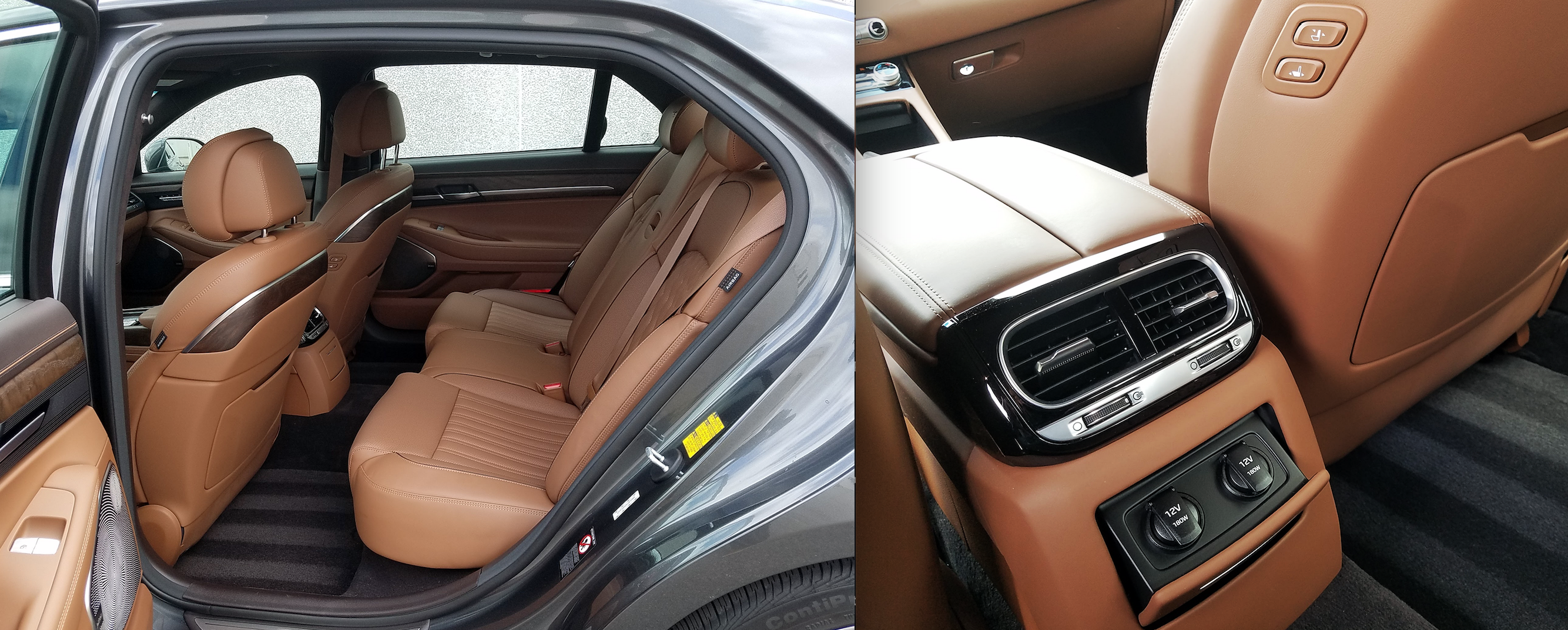
One thing that hasn’t changed about the Genesis G90 is model availability. It’s still presented as a Premium with a 3.3-liter turbocharged V6 or—for $3500 more—as an Ultimate with a 5.0-liter V8. Both are available with rear-wheel or all-wheel drive, and they come complete, with no other options. Consumer Guide tested a 3.3T Premium with AWD, which costs $75,695 with delivery. With the rear-wheel driveline the same car would cost $2500 less.
Test Drive: 2020 Toyota Avalon TRD
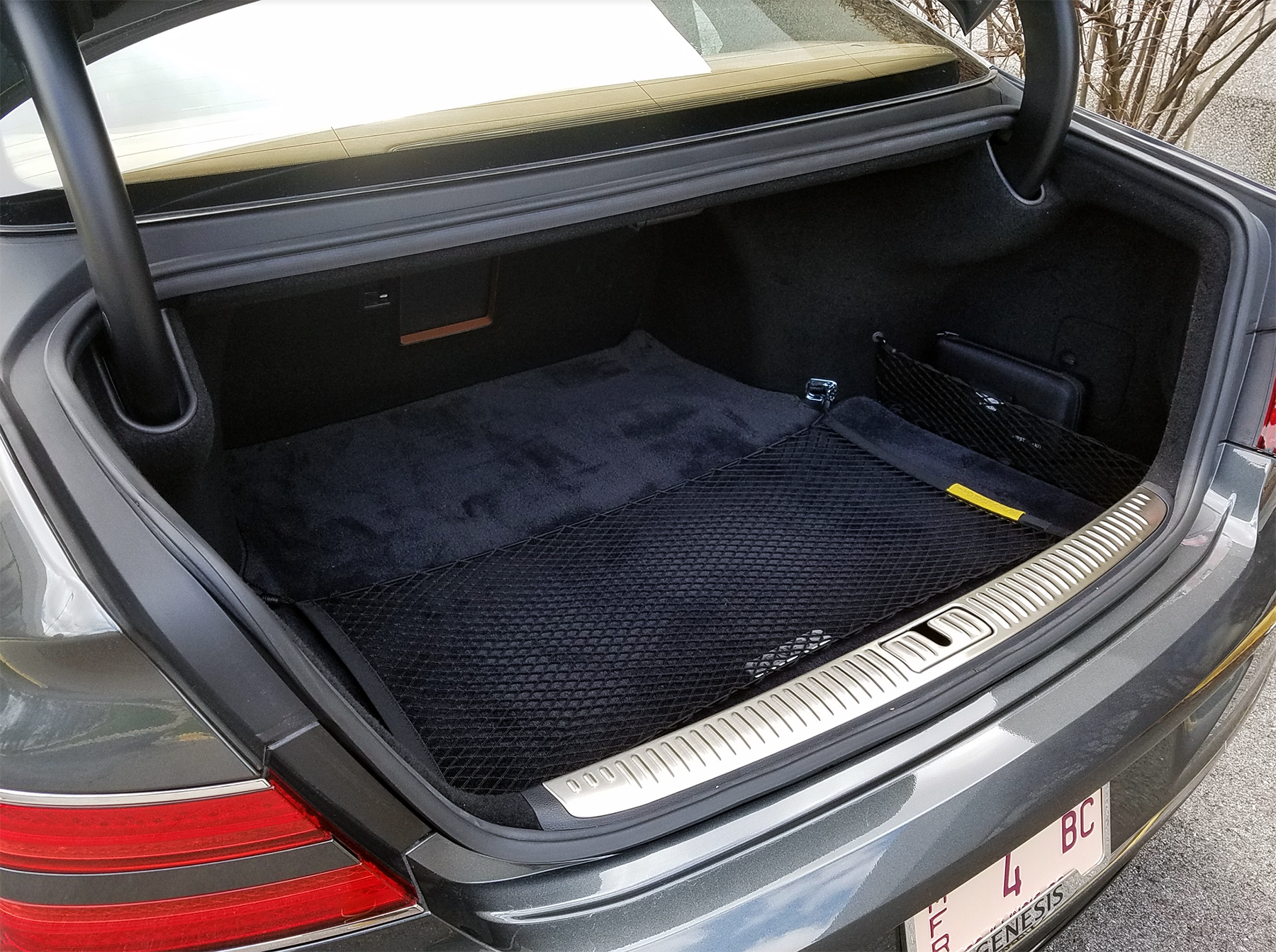
Neither has there been any alteration to the impressive level of luxury. The interior is spacious in either row, with gobs of head- and legroom. The back seat could accept a third adult in the middle, at least for short rides. Rich, supple Nappa leather covers the highly comfortable seats, which are heated and ventilated in front, and heated in back. (The V8 model adds rear-seat ventilation and backrest adjustment.) The driver’s seat has 22 power-adjusted settings, the front passenger seat 16. Select “Sport” mode and the side bolsters on the seat constrict slightly to provide extra lateral support in aggressive cornering.
Interior fittings feature a microfiber suede headliner, a leather-wrapped dash, lots of matte-finish wood trim, and soft-touch surfaces just about everywhere, even all the way down the doors. There are seven colors of ambient LED interior lighting. Occupants enjoy these tony surroundings with the added benefit of great quiet, and driver vision is good overall, though rear pillars are kind of wide by the time they reach their base.
G90 conveniences count tri-zone automatic climate control, a head-up instrument display, power rear sunshades, an electronic parking brake, keyless entry and starting, wireless charging, autodimming rearview mirror, hands-free trunk opener, power door closure, steering-linked LED headlights, and a power sunroof. A 17-speaker surround-sound audio system incorporates HD and satellite radio, as well as a CD player.
Twin dials let front-seat passengers easily make temperature selections, but everything else is subject to a double row of satin-silver buttons—lots of satin-silver buttons. (Another array of them between the audio knobs handles navigation.) Rear passengers have a full control panel for climate and audio at their disposal in the pull-down armrest. Even with a central controller on the console—that curious signifier of status so beloved of luxury-car manufacturers—audio settings are easy to tune and save because a surface tuning knob (there’s one for volume too) makes that uncomplicated. You’ve just got to tap the controller to save. Infotainment selections show up on a big 12.3-inch screen.
Test Drive: 2020 BMW 740i xDrive
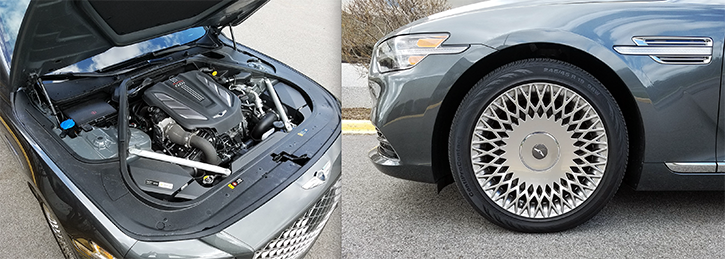
The new safety and driver-assistance features join an existing list that consists of adaptive cruise control, blind-spot and rear cross-traffic warnings, lane-keeping assist, driver-attention warning, 360-degree multiview monitor, parking assists, and automatic headlight high-beam control.
Interior-storage alternatives start with a well-dimensioned glove box and a useful console box with divided, side-hinged lid sections. The console houses covered cup holders and a covered bin for wireless charging. There are hard-sided pockets on the backs of the front seats, and a modest covered bin and cup holders in the rear armrest. Large pockets are found in all four doors. The trunk is roomy and nicely finished—a good thing, too, since (like many large sedans) the rear seats don’t fold. There is a large central pass-through to the rear-seat area.
Test Drive: 2019 Volkswagen Arteon R-Line

The 3.3-liter V6 makes the same 365 horsepower it has since the G90 first appeared on the scene. It’s enough for a high level of smooth, sure power delivery, even if it pulls up just short of breathtaking. The 8-speed automatic-transmission operates with delightful subtlety in normal use. Out on the highway it kicks down snappily to enable highway passing. In all-wheel-drive Premiums, the EPA fuel-economy estimates for this powerteam are 17 mpg in the city, 25 on the highway, and 20 mpg combined. Though his test was relatively limited at 69 miles (25 percent in city-type operation), this driver saw 26.3 mpg.
“Intelligent Drive Mode” gives drivers a choice of four performance settings that modify engine, damping, and steering characteristics. Ride in the default “Comfort” mode is soft—it may feel a little floaty to some. Sport tends to make the adaptive suspension with electronically controlled dampers clamp down a little on vertical body motions, while it also switches on modestly weightier and more precise steering. Frankly, there’s nothing wrong with Sport as a day-in, day-out mode, which is where “Custom” comes in. It allows drivers to pick the ride/handling benefits with Comfort’s tamer, more-economic engine operation. The 19-inch alloy wheels are clad in staggered-width tires for better grip and handling.
The Genesis G90 lacks the pedigree of the “big guys” in the luxury-sedan field—one of whom lays claim to practically inventing the automobile—but it can play their game. It’s still a gem.

Listen to the Consumer Guide Car Stuff Podcast
2020 Genesis G90 3.3T Gallery
2020 Genesis G90 3.3T


